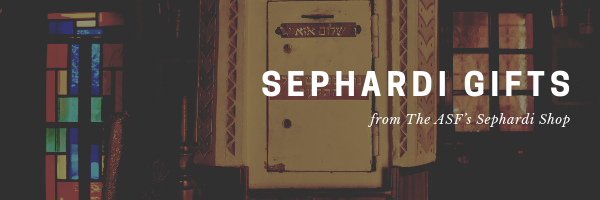“For the sake of the Jewish people as a whole,” the ASF joins Rabbi Daniel Bouskila in hoping for the reassertion of Classic Sephardic Judaism as a force for unity and strength in these troubled times
Sephardi World Weekly is made possible by Professor Rifka Cook, Maria Gabriela Borrego Medina, Rachel Amar, Deborah Arellano, & ASF VP Gwen Zuares!
Click here to dedicate a future issue in honor or memory of a loved one
Click here for upcoming events
😴“Sleeping through a Revolution?--Thoughts for Vayakhel-Pekudei”
By Rabbi Marc D. Angel, Institute for Jewish Ideas and Ideals
Rabbi Marc D. Angel, PhD speaking at the Opening of Sephardic Journeys, a Center for Jewish History with American Sephardi Federation exhibition in The David Berg Rare Book Room, 28 May 2015.
Sephardic Journeys can be viewed online at Google Arts & Culture.
(Photo courtesy of Irina Tsukerman)
Political polarization is becoming a global problem, and according to R’Marc D. Angel, Jewish communities both in Israel and abroad are subject to the worldwide trend: “Within the Orthodox world, there has been a… dangerous increase in authoritarianism, obscurantism, and intellectual narrowness. Within the Jewish community at large, there [is]… alienation from traditional Judaism [and] increased secularization.” Associatively connecting this week’s Torah portion to the challenge of maintaining a vibrant and integrated center, R’Angel passionately reaffirms a kahal (community) of “idealists and activists” inspired by a larger vision “to re-energize Judaism, to re-generate its intellectual vibrancy, to foster a Judaism that is compassionate, inclusive, open, awake, engaged; that is alive with energy, spirituality, beauty; that sees Judaism as a world religion with a message for all humanity.”
~~~~~~~
Feature: Remarkable Images from the Lost World of Jewish Afghanistan✨📷
Recorded Jewish History in Afghanistan dates back to the 8th century, although various traditions place the origin of the community much further in the distant past. In recent centuries, Jews fleeing religious persecution in Persia found refuge in the country, and a large community developed in the city of Herat. Today, however, there is no Jewish life in Afghanistan. What remains are personal memories, scattered artifacts, and remarkable images, like the ones in this video.
~~~~~~~
⚰️“Restoration of Herat Cemetery by Afghanistan Expat”
By Barbara Angelakis, New York Jewish Travel Guide
The ASF’s Afghan Taskforce headed by Osnat Gad and a delegation of community leaders & friends (including Afghanistan’s Former Minister of Agriculture Assad Zamir, the Philos Project, the Museum of Bible, & TriBeCa Synagogue) to the Kite Runner on Broadway, which started ASF NYSJFF Pomegranate Awardee Amir Arison! Helen Hayes Theatre, NYC, 12 October 2022
(Photo courtesy of ASF Twitter/Zakaria Siraj)
Osnat Gad is “a talented and successful Jewelry designer and poster child for the American Dream.” In 1961 she immigrated with her family to the United States from their “ancestral home” in Herat, Afghanistan, a city with a long Jewish past where no Jews remain. “Of the four original synagogues in Herat, two were converted to mosques, one turned into a school, and the last one, the Yu Aw shul, has become an Islamic cultural center.” In 2013, Gad received a mail from a local Muslim with information about Herat's crumbling Jewish cemetery, which she was inspired to restore. After raising funds and receiving authorization from the U.S. State Department and the authorities in Afghanistan, Gad succeeded in her mission. She also collected a treasure trove of cultural artifacts along the way, and one task remains, “As soon as funds become available, this extraordinary story… will be retold in a museum exhibition to be held at The American Sephardi Federation… entitled ‘The Hidden World of Afghan Jews.’”
~~~~~~~
The American Sephardi Federation invites all individuals, communities, and organizations who share our vision & principles to join us in signing the American Sephardi Leadership Statement!
Please also support the ASF with a generous, tax-deductible contribution so we can continue to cultivate and advocate, preserve and promote, as well as educate and empower!
~~~~~~~
Exploring Sephardic Customs and Traditions
By Hakham R’Marc D. Angel, Ph.D
Over the centuries, Jewish communities throughout the world adopted customs that enhanced and deepened their religious observances. These customs, or minhagim, became powerful elements in the religious consciousness of the Jewish people. It is important to recognize that minhagim are manifestations of a religious worldview, a philosophy of life. They are not merely quaint or picturesque practices, but expressions of a community’s way of enhancing the religious experience. A valuable resource for Sephardim and Ashkenazim alike.
Remnant of Israel a Portrait of America’s First Jewish Congregation
by Rabbi Dr. Marc D. Angel
Special Edition for the American Sephardi Federation
Published to mark Shearith Israel’s 350th anniversary, Remnant of Israel a Portrait of America’s First Jewish Congregation tells their individual stories as well as the history of the Congregation, explaining its origins, its rituals, and its traditions. It is profusely illustrated with portraits, historical documents and ritual objects. This book tells a fascinating story, one that will appeal to anyone interested in the history and culture of the Jewish People, of New York City, and of the United States.
~~~~~~~
Upcoming Events or Opportunities
The the International Lab for Research and Leadership in Interfaith Collaboration and Coexistence presents:
The Journey of the Sarajevo Haggadah
“Join us for a special event hosted by The International Lab for Research and Leadership in Interfaith Collaboration and Coexistence. We present the story of the Sarajevo Haggadah, one of the oldest Sephardic Haggadahs in the world, originating in Barcelona ca. 1350.
We will discuss the journey of its safety by courageous individuals of different faiths through amazing acts of courage, compassion, and collaboration. See how this story applies in today’s world to prevent hate through understanding and recognition of common human values. At this special event, a rare copy of The Sarajevo Haggadah will be on display.”
Monday, 20 March at 5:00PM EDT
Teachers College, Columbia University, Milbank Chapel
525 West 120th Street New York, NY 10027
Sign-up Now!
“The importance of social cohesion and interfaith coexistence.
The evening will feature a special panel, moderated by Dr. Amra Sabic-El-Rayess, with experts who will engage in a meaningful dialogue on the transformative power of interfaith collaboration, coexistence, and leadership, all of which are foundational ideas of The International Interfaith Lab.
About the International Interfaith Research Lab:
The Lab serves as a center of excellence for research, leadership, and training, amplifying protective factors against all forms of hate based on one's religion, race, or ethnicity. To sustain and expand global efforts to lessen hate and counter extremism, the Lab will create spaces and design educational experiences for interfaith dialogue, collaboration, and coexistence.”
~~~~~~~
The Belzberg Program in Israel Studies at the University of Calgary and the Schusterman Center for Israel Studies at Brandeis University. With the collaboration of the American Sefardi Federation, Centro Sefarad Israel, and the International Network for Jewish Thought present:
Sephardi Modernities Seminar Series, 2023
Join us as we explore the relationship between our narratives about the past and the future to which we aspire. The ways in which scholars approach the stories, events, characters, and historical processes of the Sephardi/Levantine past are inevitably guided by values, by their moral and political beliefs. Which elements of the past do they strive to preserve, reclaim and grant continuity? What are they trying to say about a potential future? Which stories become part of canonized history, and which ones are dismissed as mere anecdotes? Which theoretical, social, political, and cultural frameworks do they wrestle with, and which do they seek to advance?
On Zoom
(Registration is required for each session)
23 March at 12:00PM EDT
How Do Judeo-Spanish Proverbs and Tales Communicate with Us and How Do We Communicate With Them?
Lital Belinko-Sabah, Hebrew University of Jerusalem
Sign-up Now!
18 April at 12:00PM EST
‘Modernity’ and ‘Tradition’ on the Move: Spanish Moroccan Jews and their Diasporas
Aviad Moreno, Ben-Gurion University of the Negev, in conversation with Angy Cohen, University of Calgary
Sign-up Now!
9 May at 12:00PM EST
Sephardi Musical Modernities: Listening to the Past in the Future
Edwin Seroussi, Hebrew University of Jerusalem
Yair Dalal, Composer, violinist, oud player, singer, and teacher
Sign-up Now!
Throughout this year’s series we will discuss the future invoked by each way of looking at the past, the political agendas of historical research, and the values that unavoidably guide scholastic inquiry. Topics include the transmission of narratives among collectives and among researchers, ownership of archives, encounters with the past, the academic legitimacy of certain topics and collectives, vehicles of memory (music, oral history, proverbs, etc.) and the construction of historical narratives.
Organized by Dr. Angy Cohen, Inaugural Hy and Jenny Belzberg Postdoctoral Associate in Israel Studies, Department of Anthropology and Archaeology at the University of Calgary, and Dr. Yuval Evri, Assistant Professor of Near Eastern and Judaic Studies on the Marash and Ocuin Chair in Ottoman, Mizrahi, and Sephardic Jewish Studies, Brandeis University.
~~~~~~~
The Posen Library of Jewish Culture & Civilization with Congregation Shearith Israel, Center for Jewish History, American Jewish Historical Society, Leo Baeck Institute, and the American Sephardi Federation present:
The Early Modern Period, 1500-1750, Volume 5
“Join Professors Deborah Dash Moore, Elisheva Carlebach, Francesca Bregoli, and Mayer Juni to celebrate the publication of The Early Modern Period, 1500-1750, Volume 5 of The Posen Library of Jewish Culture and Civilization edited by Yosef Kaplan. The discussion will present fascinating dimensions of Jewish culture and civilization across three centuries from 1500 to 1800.”
Featuring a short performance by the Shearith Israel Choir and a panel discussion with distinguished Jewish historians.
Followed by a reception in the Levy Auditorium
Thursday, 23 March 23 at 7:00PM EST
(Complimentary RSVP)
Congregation Shearith Israel, Main Sanctuary
2 West 70th Street at Central Park West, New York City
Sign-up Now!
“Accessibility: The landmark synagogue building does not have an elevator. We do have people on hand to provide mobility assistance, including with the aid of a wheelchair climber that can take wheelchair users upstairs to the Sanctuary and downstairs to the Levy Auditorium. Please let us know if you expect to need assistance.”
~~~~~~~
The American Sephardi Federation, in partnership with Center for Jewish History, Kulanu, Project Shema, Kahzbar, Be’chol Lashon and Jewish Multiracial Network presents:
The Hidden Jews of Ethiopia
Film Screening and Discussion
Nafkot – Yearning, a new film by Dr. Malka Shabtay
The Hidden Jews of Ethiopia, a new book by Dr. Marla Brettschneider
Sunday, 2 April at 4:00PM EST
(Followed by a reception)
At the Center for Jewish History
(Tickets: In-person $15)
Sign-up Now!
Panelists:
Dr. Malka Shabtay is an applied anthropologist who has worked for decades with the Ethiopian Jewish community in Israel and more recently in Ethiopia. Author of many books, she has taught in numerous academic institutes including the Ruppin Academic Center and the Institute for Immigration and Social Integration. Shabtay combines research, consultancy, and training for organizations applying cultural and cross-cultural perspectives in their work. Nafkot (Yearning 2022) is her second ethnographic film.
Belayneh Tezabku, Community Leader
Mr. Belayneh Tazebku Worku is one of the leaders of the Ethiopian North Shewa Bete-Israel community and serves as the manager of the synagogue, Brit Olam, in Addis Ababa. Working in the community for twenty-five years, Tazebku Worku has focused on raising awareness and community organizing both locally and nationally toward full civil and human rights of the Bete Israel people and community. Tazebku Worku also works to meet concrete current needs of the community such as the creation of a Jewish cemetery and a Bete Israel community settlement in Debre Berhan, in the Amhara region.
Dr. Marla Brettschneider, Professor holds a joint appointment in Politics & Feminist Studies at the University of New Hampshire. She is a groundbreaking scholar of Jewish diversity politics and political theory, also using diversity as a frame to address antisemitism in the US and globally. Lecturing widely and author of numerous award-winning books, her works include: Jewish Feminism and Intersectionality; The Family Flamboyant: Race Politics, Queer Families, Jewish Lives; The Hidden Jews of Ethiopia; The Jewish Phenomenon in Sub-Saharan Africa, & The Narrow Bridge: Jewish Views on Multiculturalism with a forward by Cornel West.
Sponsorship opportunities available:
~~~~~~~
The Posen Library of Jewish Culture & Civilization with Congregation Shearith Israel, Center for Jewish History, American Jewish Historical Society, Leo Baeck Institute, and the American Sephardi Federation present:
The Early Modern Period, 1500-1750, Volume 5
“Join Professors Deborah Dash Moore, Elisheva Carlebach, Francesca Bregoli, and Mayer Juni to celebrate the publication of The Early Modern Period, 1500-1750, Volume 5 of The Posen Library of Jewish Culture and Civilization edited by Yosef Kaplan. The discussion will present fascinating dimensions of Jewish culture and civilization across three centuries from 1500 to 1800.”
Featuring a short performance by the Shearith Israel Choir and a panel discussion with distinguished Jewish historians.
Followed by a reception in the Levy Auditorium
Thursday, 23 March 23 at 7:00PM EST
(Complimentary RSVP)
Congregation Shearith Israel, Main Sanctuary
2 West 70th Street at Central Park West, New York City
Sign-up Now!
“Accessibility: The landmark synagogue building does not have an elevator. We do have people on hand to provide mobility assistance, including with the aid of a wheelchair climber that can take wheelchair users upstairs to the Sanctuary and downstairs to the Levy Auditorium. Please let us know if you expect to need assistance.”
~~~~~~~
ASF Broome & Allen & ADL Collaborative for Change Fellow Isaac de Castro presents:
Entre Diasporas: Telling the Latin-American Jewish story. Contando la historia judía latinoamericana
Tell your story. Cuenta tu historia.
We’re looking for first-generation Latino Jews in the United States who immigrated because of political and social turmoil. Jews of Sephardic descent from Colombia, Cuba, and Venezuela that now reside in the Miami area will be given priority, but others are welcome to apply as well.
Fill out this form to be considered as an interviewee for this project. After you’ve submitted, we will be in touch promptly to set up a preliminary phone call.
Click here for more information.















